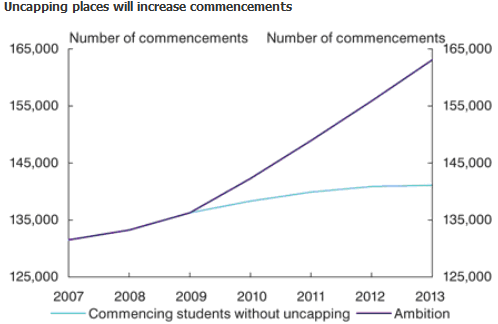|
|
|
|
|
|
|
News & Views item - May 2009 |
![]() Upping Parental Income Test Threshold for Access to Youth Allowance Expected to
Increase Number of Eligible Students by 17%. (May 21, 2009)
Upping Parental Income Test Threshold for Access to Youth Allowance Expected to
Increase Number of Eligible Students by 17%. (May 21, 2009)
According to the Group of Eight analysis of the 2009 Budget reveals that the changes to parental income tests and the treatment of equity scholarships will increase the number of low income students eligible for Youth Allowance and financial support from universities and private philanthropy.
In a statement released by the chair of the Go8, Professor Alan Robson, he said:
The Government has significantly increased the parental income test threshold for access to Youth Allowance. This measure will apply from January 2010 and will increase the number of eligible students by 17 per cent.
For example, a family in which two students are living away from home will be able to earn up to $139,388 before those students lose their Youth Allowance payments. This represents almost double the allowable income under current arrangements.
New start-up and relocation scholarships for all students on Youth Allowance will also make a big difference, especially for families in rural and regional areas.
The Go8 particularly applauds the Government's decision to remove university and private equity scholarships from the income test.
The Go8 has long advocated this measure. As far back as 2002 the Go8 highlighted the fact that treating equity scholarships as income was a major disincentive for their provision because most students on such scholarships would lose their Youth Allowance.
I am confident this decision will result in a substantial increase in the number of university and private scholarships available to students from low income backgrounds.

Source: Australian Government, Transforming Australia's Higher Education System,
Fact Sheet 15 "Student Income Support, Parental Income Test", May 2009
However, what is an ongoing conundrum for both government and university administrations is how will the sector meet a goal of increasing the quality of teaching and research -- essential if Australia is to raise its game -- with the ongoing constraints on public resourcing and increasing pressure of undergraduate student numbers.
It is well past time that the a serious "business plan" be developed between the universities and the government to allow useful forward planning. Chasing after ERAs, hubs and spokes, or a Tertiary Education Quality and Standards Agency are no substitute but rather, to a greater or lesser degree, pernicious distractions.
The following two charts are taken from Minister of Education, Julia Gillard's, May 21st post budget speech - Investing in education and innovation to create the jobs of the future hosted by the Office of Knowledge Capital and City of Melbourne. They indicate that considerable pressure will be placed on the tertiary sector in the coming four years.

